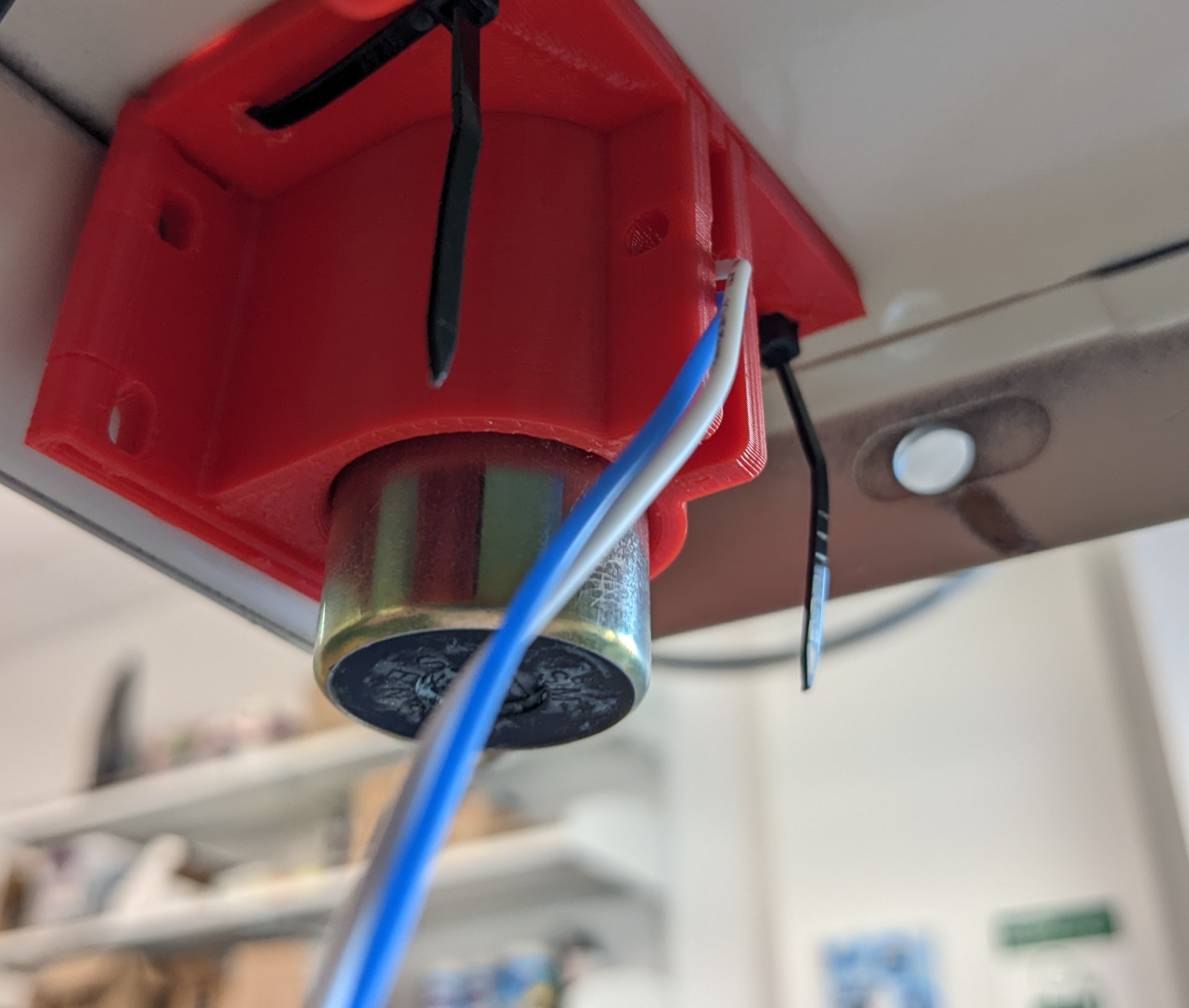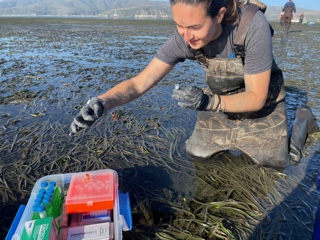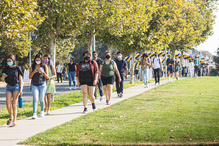Academic Year 2021-2022
“A Smart Kiosk for Raising Awareness of Recycling in the UC Merced”
PI: Ahmed Sabbir Arif. Co-PI:Shijia Pan
School of Engineering - Electrical Engineering and Computer Science

This exploratory project will investigate whether it is possible to encourage people to recycle through a kiosk using the concepts of image processing, machine learning, and persuasive computing. It will develop a low-cost kiosk prototype, which will be installed by an indoor recycling and trash disposal station for a period. It will include three major modules: a sensing module, including a camera and a vibration sensor, a user interface module with a conversational chatbot interface, and a processing module that will process sensor data and the data collected by the chatbot to recognize objects or materials. Through a range of quantitative and qualitative analysis, the project will evaluate the effectiveness of the sensing technology, identify common kiosk usage patterns, the effects of reward-based incentives on recycling behaviors, and potentially a novel way to identify materials using acoustic signals. If the findings are promising, similar devices could be installed in other locations.
Additional information: Inclusive Interaction Lab = https://www.theiilab.com
“Microbial Communities associated with the seagrass Zostera marina”
PI: Maggie Sogin. Co-PIs: Clarissa Nobile, Aaron Hernday, Juris Grasis
School of Natural Sciences – Quantitative & Systems Biology

Seagrasses are among the most efficient sinks of carbon dioxide on Earth: despite covering less than 0.1% of the world's oceans, they are responsible for the burial of up to 10% of marine organic carbon. While we know that the ability of terrestrial plants to bury organic carbon is intimately linked to the microbial communities living in symbiosis within their tissues and soils, we know comparatively less about the interactions between marine plants and their microbiomes. Our research project seeks to develop a deeper understanding of the role of marine microbes in sequestrating organic carbon in seagrass meadows. Specifically, with funding from the CoR we will develop an in-depth description of the metabolism of microorganisms associated with the seagrass Zostera marina. Z. marina is globally distributed throughout the Northern Hemisphere, including the coastal waters off California – therefore the success of this plant species is important for the ability of coastal regions in CA to sequester carbon from the atmosphere. Our goal is to generate genome scale metabolic models from a broad range of microorganisms associated with seagrasses. We also aim develop culture resources by brining many of these microorganisms into culture. Resources resulting from this work will help our team develop a better understanding of plant interactions with their microbial communities and will enable us to explore the potential for enhancing the scale of seagrass restoration activities leading to the expansion of this sustainable California carbon reservoir.
“Wildfire emissions in the age of COVID-19: insights from indoor and outdoor air quality in a university campus”
PI: Jeanette Cobian-Iñiguez(1). Co-PI: Ricardo Cisneros (2)
1. School of Engineering – Mechanical Engineering
2. School of Social Sciences, Humanities, and Arts – Public Health

Wildfire activity has increased in recent years in multiple regions and ecosystems around the globe. As wildfires are predicted to continue increasing, the potential impacts to air quality will likely follow an increasing trend. In California, the compounding effects of wildfire smoke and the COVID-19 pandemic are particularly relevant as record-breaking fires have impacted the state in the past two years. In the San Joaquin Valley where high COVID-19 infection rates are already prevalent, the effect of wildfire smoke on human health may have significant effects. This is because wildfire smoke may have a compounding effect on human health as studies have shown that smoke may produce increased vulnerability to respiratory disease. For UC Merced, this signifies that, students and employees may be at higher risk for respiratory disease during fire events. Thus, to better understand the degree of exposure the campus community has to wildfire smoke and the overall prevalence of PM, the goal of the study that we will be conducting is to monitor, characterize and analyze indoor and outdoor air quality in key spaces of the UC Merced campus. We will monitor air quality in a central outdoor location on campus and inside The Pavilion cafeteria. We believe that the study is particularly relevant to our UC Merced community as the risk here is elevated by the regional susceptibility to wildfires, where even in the absence of viral infection events, smoke exposure may increase health risks. Part of the project includes the development of an online dashboard, the Bobcat Air Quality Dashboard, which will provide the campus community information about campus air quality. The air quality measurement campaign will be focused on measuring particulate matter concentrations (outdoor and indoor air quality) and CO2 (as a measure of indoor ventilation). To isolate the effects of wildfire smoke, measurements will be taken during the pre-fire and active-fire seasons.
“The Livingston Centennial Project”
PI: Jayson Beaster-Jones. Co-PIs: David Torres-Rouff, Anne Zanzucchi
School of Social Sciences, Humanities, and Arts – Interdisciplinary Humanities
Gateway to Merced is an oral history project designed to strengthen ties between UC Merced and the ethnic and geographic communities of Merced County. We aim to contribute to the cultural and economic sustainability of the county while also providing an inclusive, hands-on humanistic experience for people from every community. The summer 2022 collaboration is a community-engaged project that continues existing partnerships with the City of Livingston and the Livingston Historical Society. In supporting the Livingston Centennial Celebration in 2022-23, we will develop the archives through the collection and collation of documents and oral histories of Punjabi Sikh and Latinx populations of Livingston, two communities that are largely unrepresented in the existing Livingston Historical Society archive and in the State of California, more generally. Inasmuch as this proposal addresses issues of social justice and cultural-religious sustainability in the San Joaquin Valley, the three projects described below fulfill the sustainability mission of the UC Merced Strategic Plan.
This collaboration for the Livingston Centennial Celebration has three interrelated projects that will be developed into history and social studies curriculum in Livingston public schools. In the first project, undergraduate researchers who are fluent in Punjabi language will assist Dr. Jayson Beaster-Jones in collecting oral histories of Livingston’s Sikh community and documenting day to day life through ethnographic research. In the second project, students will assist Dr. David Torres-Rouff in archival research at the Livingston History Museum that will illuminate the lives of Latinx and Punjabi residents beyond farm work. The third project, led by
Dr. Anne Zanzucchi, gathers participants from the Great Valley Writing Project with the UC Merced Writing Project as a professional community for teacher leaders and writing across the curriculum initiatives. Dr. Zanzucchi will host an advanced institute during Summer 2022 for 20 middle and high school teachers, with a focus on oral history projects and developing youth storytelling curricula.



